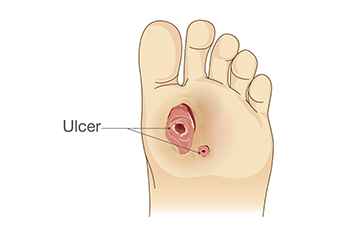
Non-healing foot ulcers in diabetic patients are influenced by a myriad of factors, including the wound environment, the patient's general health, and the medications they are taking. A compromised wound environment, often characterized by high bacterial load, excess moisture, or inadequate blood supply due to peripheral arterial disease, can impede healing. Additionally, the patient's overall health status plays a significant role, with conditions like obesity, smoking, and immune system deficiencies hindering the body's ability to repair tissues. Medications such as corticosteroids and certain chemotherapeutic agents may also interfere with wound healing processes. Addressing these multifaceted challenges requires a comprehensive approach, encompassing wound debridement, infection control, and optimizing the patient's general health through lifestyle modifications and medication adjustments. If you suffer from diabetic foot ulcers, it is strongly suggested that you are under a podiatrist to enhance healing outcomes and reduce the risk of serious complications.
Wound care is an important part in dealing with diabetes. If you have diabetes and a foot wound or would like more information about wound care for diabetics, consult with one of our podiatrists from Pocono Foot & Ankle Consultants. our doctors will assess your condition and provide you with quality foot and ankle treatment.
What Is Wound Care?
Wound care is the practice of taking proper care of a wound. This can range from the smallest to the largest of wounds. While everyone can benefit from proper wound care, it is much more important for diabetics. Diabetics often suffer from poor blood circulation which causes wounds to heal much slower than they would in a non-diabetic.
What Is the Importance of Wound Care?
While it may not seem apparent with small ulcers on the foot, for diabetics, any size ulcer can become infected. Diabetics often also suffer from neuropathy, or nerve loss. This means they might not even feel when they have an ulcer on their foot. If the wound becomes severely infected, amputation may be necessary. Therefore, it is of the upmost importance to properly care for any and all foot wounds.
How to Care for Wounds
The best way to care for foot wounds is to prevent them. For diabetics, this means daily inspections of the feet for any signs of abnormalities or ulcers. It is also recommended to see a podiatrist several times a year for a foot inspection. If you do have an ulcer, run the wound under water to clear dirt from the wound; then apply antibiotic ointment to the wound and cover with a bandage. Bandages should be changed daily and keeping pressure off the wound is smart. It is advised to see a podiatrist, who can keep an eye on it.
If you have any questions, please feel free to contact our offices located in Stroudsburg, Nazareth, and Easton, PA . We offer the newest diagnostic and treatment technologies for all your foot care needs.




